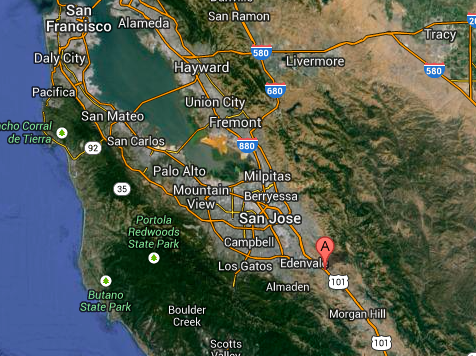Almost exactly a year ago, an attack on a major transformer substation outside of San Jose highlighted one of America’s most serious vulnerabilities: If the power goes off and stays off, our nation and the vast majority of its population will cease to exist.
The perpetrators of the April 16, 2013 assault on the Metcalf Substation, whose twenty-one high-voltage transformers provide electricity to Silicon Valley and much of the San Francisco Bay area, successfully damaged seventeen of them. They narrowly missed destroying these effectively irreplaceable assets outright, and probably the other four in the process.
Had they done so, the power would likely have been off in major populated areas and Northern California-based wellsprings for the nation’s economy for protracted periods–possibly for years.
Since the attackers got clean away, we must assume they are in a position to engage in similar destruction in the future. And, as the Wall Street Journal reported, if as few a certain nine of these substations are taken down, the entire grid could be cratered. The effects would be nothing short of catastrophic.
Unfortunately, this sort of direct physical assault is not the only threat to the nation’s electricity distribution infrastructure. Others include:
- attacks creating localized, but possibly devastating, power surges through the use of radio frequency weapons;
- cyber warfare against the grid, which the Bipartisan Policy Center recently reported is “increasing in both frequency and sophistication”; and
- a high-altitude electromagnetic pulse (EMP) caused by the detonation of a nuclear weapon outside the atmosphere above the United States.
Such events could disable or destroy outright key parts of the power grid, prompting the cascading collapse of every one of the other critical infrastructures that assure the availability of water, food, medicine, finance, transportation, telecommunications, etc.
It is hard to overstate the repercussions. For example, the chairman of a blue-ribbon congressional task force charged with assessing the EMP threat has estimated that, if the power is off over wide areas of the country for more than a year, nine out of ten Americans would be dead.
Unless we take steps to protect the grid against such threats, even if none of our enemies precipitate this sort of disaster, it is certain to be caused by another source: Roughly every 150 years, the earth is subjected to EMP-like effects as a result of an intense solar flare (also known as a coronal mass ejection). The most recent of these solar storms, called a “Carrington Event,” occurred in 1859, one-hundred-and-fifty-five years ago.
The good news is that we know how to fix the grid’s vulnerabilities. The Pentagon has been hardening its critical assets against EMP for over five decades. Known and relatively affordable technologies can protect our power grid and the 21st Century American economy, society and population that absolutely depend upon it.
The bad news is that, despite the fact that such threats and their dire implications have been validated by no fewer than 11 government studies (see: http://www.centerforsecuritypolicy.org/2014/03/12/guilty-knowledge/), the electric utilities have been resistant to efforts to address their infrastructure’s vulnerabilities, evidently out of a concern about the associated costs and possible additional regulatory burden. And to date, neither federal nor state-level authorities have overcome such opposition–or even tried.
California’s near-miss with disaster at the Metcalf Substation is a wake-up call for every American. Each of us has a personal stake in ensuring that the grid is protected against all these hazards.
The costs are not trivial. For example, “hardening” just the country’s roughly 2,000 high-voltage transformers is estimated to cost about $2 billion. Compared to the incalculably high price of allowing the grid to be disrupted for protracted periods, however, even the substantially higher cost of protecting its other indispensable elements (e.g., power generation sites, control rooms and dedicated telecommunication networks) has been described by one government report as “modest by any standard.”
In the face of opposition from the electric utilities and inaction from the government, the public needs to become aware of the stakes–and to demand corrective action. State lawmakers across the country and even a few at the federal level now recognize the danger and will, with popular support, succeed in enacting legislation that will ensure the grid is protected.
But they–and, for that matter, President Obama–need to hear from us. Add your voice to the petition at www.FixthePowerGrid.com.
Frank J. Gaffney, Jr. formerly acted as an Assistant Secretary of Defense under President Reagan. He is President of the Center for Security Policy (www.SecureFreedom.org), a columnist for Breitbart News Network and host of the nationally syndicated program, Secure Freedom Radio.
Image: Google Maps

COMMENTS
Please let us know if you're having issues with commenting.